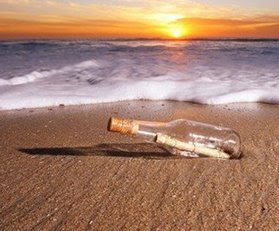He walked over and saw an envelope tucked inside. After slicing the bottle open, Brandell found a message from an elementary school student in a suburb of Seattle. The fact that the letter traveled 1,735 miles without any help from the U.S. postal service is unusual, but that's only the beginning of the mystery.
About 21 years passed between the time Emily Hwaung put the message in a soda bottle and Merle Brandell picked it up on the beach.
"This letter is part of our science project to study oceans and learn about people in distant lands," she wrote. "Please send the date and location of the bottle with your address. I will send you my picture and tell you when and where the bottle was placed in the ocean. Your friend, Emily Hwaung."
Brandell, 34, a bear hunting guide and manager of a local water plant, said many of the 70-plus residents of Nelson Lagoon were intrigued by his find. Beachcombing is a popular activity in remote western Alaska. Among the recent discoveries was a sail boat that washed onto shore last October.
"It's kind of a sport. It keeps us occupied. It's one of the pleasures of living here," Brandell said of the village reachable only by plane or boat that is too small to have its own store.
He had no idea just how unusual his find was until he tried to track down the sender: a fourth grader from the North City School in the Shoreline School District.
No one answered the phone when Brandell called the school in December so he sent the school district a handwritten letter, which eventually ended up on the desk of district spokesman Craig Degginger.
After some searching, Degginger discovered Emily Hwaung is now a 30- year-old accountant named Emily Shih who now lives in Seattle. She was in the 4th grade during the 1986-87 school year at a school building that closed more than a year ago.
"I've been getting a kick out of it for a month now," Shih said during a recent interview.
She said she was flabbergasted by the news and immediately shared it with her Kirkland co-workers.
"I don't remember the project. It was so long ago. Elementary school is kind of foggy," Shih admitted.
The project may have been more memorable if each child had created her own message and personally dropped it in the water, but the letters from Carol Aguayo's fourth grade class were typed. The students only added their names and signed them, then a friend carried the bottles on his boat and dropped them in the ocean.
"It took away a little of the mystique," Shih said of the form letter.
She also was a little chagrined by the offer to mail a photo to whomever found the letter and by the environmental implications of dropping plastic bottles in the ocean, and noted that times have changed a lot in 21 years.
"I've had a good laugh about that with all my friends," Shih said.
As she was sharing her story with friends and co-workers, Shih realized how rare it was for a message in a bottle to arrive safely somewhere.
"Many of them had tried to do it themselves, but you never hear of one coming back. The odds are so low that you'll ever hear back from somebody," Shih said. "It was just kind of a once-in-a-lifetime thing."
Brandell has a theory about how the bottle ended up on the shore of Nelson Lagoon and how the letter remained so readable after its 21 years in transit. Maybe the bottle didn't spend those years in the water. It might have blown his way quickly and then remained buried in the mud for years.
It was found among some Japanese floats that took a similar journey many years ago. They don't really wash ashore. They extrude out of the mud and into the hands of beachcombers, who sell them on eBay or craft jewelry out of them like Brandell's mother does.




No comments:
Post a Comment